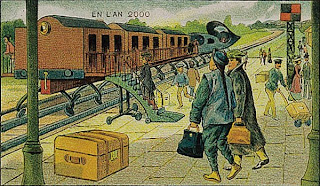 |
| "Futurama City," from the GM pavilion at the 1939 New York World's Fair. |
My record on year-end predictions is appalling. Despite long residence in the Middle East, I did not foresee the Arab Spring. I expected Romney to win the US Presidential election. Why do I bother? As a prophet, I’m at a loss.
Ah well, a thing is news because it is surprising.
The best shot, then, at getting a prediction right is to look for bubbles about to burst: things that seem inevitable, but really cannot keep on the way they are going. The problem with this, though, is knowing exactly when they will burst. For years, The Economist was talking about a US “housing bubble,” while the prices of US homes kept rising.
 |
| "In the Year 2000." French, early 20th Century. |
The housing bubble has burst, and the real estate market we once knew is not coming back. They have stopped making people in sufficient numbers, at least in North America and Europe. The public education bubble is bursting as we speak. The EU bubble is bursting, and I suspect this is only the beginning of the bursting of a much bigger bubble, the big government/civil service bubble. The costs of government simply cannot keep rising indefinitely. At a certain level of high taxation, government revenues actually start to decline. Killing the economy in the meantime.
I had begun to type “the end of the welfare state,” but I’m not sure that is right. The end of big government is not necessarily the end of the welfare state. There are small government solutions that can preserve it, like McGovern’s minimum annual income. The trick is giving the money to the poor instead of to the bureaucrats and professionals.
 |
| Sports of the future |
Most obviously, with our aging populations and spiraling health care costs, the medical profession as we know it is unsustainable. Diagnosis will soon come from the internet, and prescriptions will be written by pharmacists.
University professorships and universities are also unsustainable. The costs have become insupportable, the thinking out of touch. Technological progress means that many four-year degrees are obsolete before they are earned. In the meantime, the Internet has made universities completely unnecessary. I expect the well-known universities to continue to do well for a long time to come, essentially as ESL schools for wealthy Asians. Most North Americans and Europeans will get their higher educations online.
 |
| Communications in the future. |
China, of course, is one big fat bubble, and has been for decades. Sooner or later it will blow; perhaps this year. The pressures of the continuing recession make it more likely.
Oil is another bubble. The vast riches of the oil states of the Middle East are unsustainable. They always were unsustainable. Even a decade ago, any oil price above forty dollars a barrel or so, if sustained, would bring massive additional oil online from sites like the Athabasca Tar Sands. Now, with fracking, the new abundance of natural gas, and continually improving technology generally, that threshold price is falling fast.
 |
| Future tennis. |
As I’ve warned before in these pages, Apple is another bubble. It is due for a troubled transition without Steve Jobs, in a highly competitive, quickly changing industry. Most likely to benefit: Google.
On the other side of the coin are anti-bubbles; things that are unaccountably undervalued now, and so ripe for sudden advance. Africa is an obvious candidate. With Asia becoming developed, Africa is the best big repository of cheap labour. The Philippines should also finally start to boom. India has gone a long way on help centres. The Philippines really should be able to beat India at this game. They are more attuned to the US market, their English is easier to understand, and they are more service oriented. India can do well on corporate services, but the Philippines is the better choice for end-user customer service.
 |
| Cooking in the future. |
I believe Egypt is also rich in untapped human potential—unbelievably rich—but they may be held back by political instability. In the meantime, Turkey seems poised to surge ahead. A well-educated population, on the threshold of Europe.
3D movies are dead. It was a gimmick, and it wears thin quickly, just as it did in the 1950s. Laptops and netbooks are likely to decline, largely supplanted by tablets. I think desktops may stage a revival.
I expect Iran to have nuclear weapons by the end of the year. It seems to me that Obama and the Americans simply do not have the resolve to become involved in anything else major in the Middle East. And I suspect the Israelis have run the sums and decided they are not strong enough to do it on their own, or to cope with the possible retaliation. If, on the other hand, they do decide to go in, there is a reasonable possibility even so that their raid will be ineffectual. An Iranian bomb will probably be followed fairly quickly with a Saudi bomb, and possibly a Turkish bomb.
 |
| Farming in the future. |
The regime in Syria will fall. I expect chaos will ensue. This may also trigger another round of “Arab spring.”
Just for fun, here are a couple moer predictions I have seen elsewhere. I do not feel like joining them on their limb. 1. Civil war in the US. 2. War between China and Japan over their disputed islands.
 |
| Transportation in the future. |













No comments:
Post a Comment